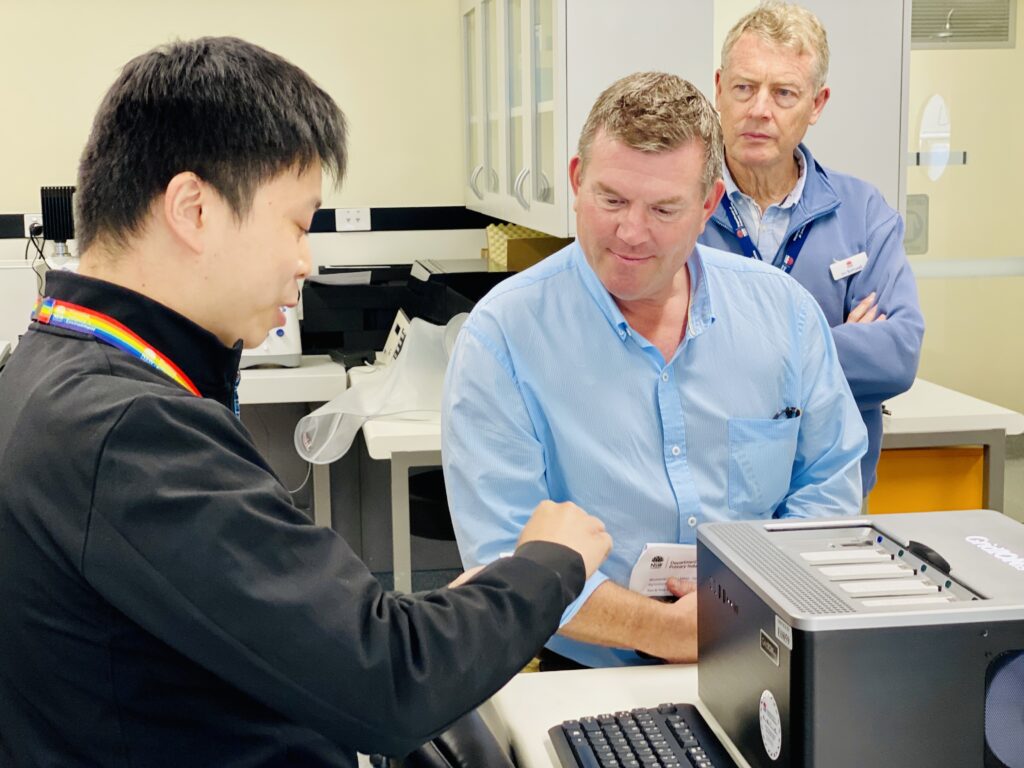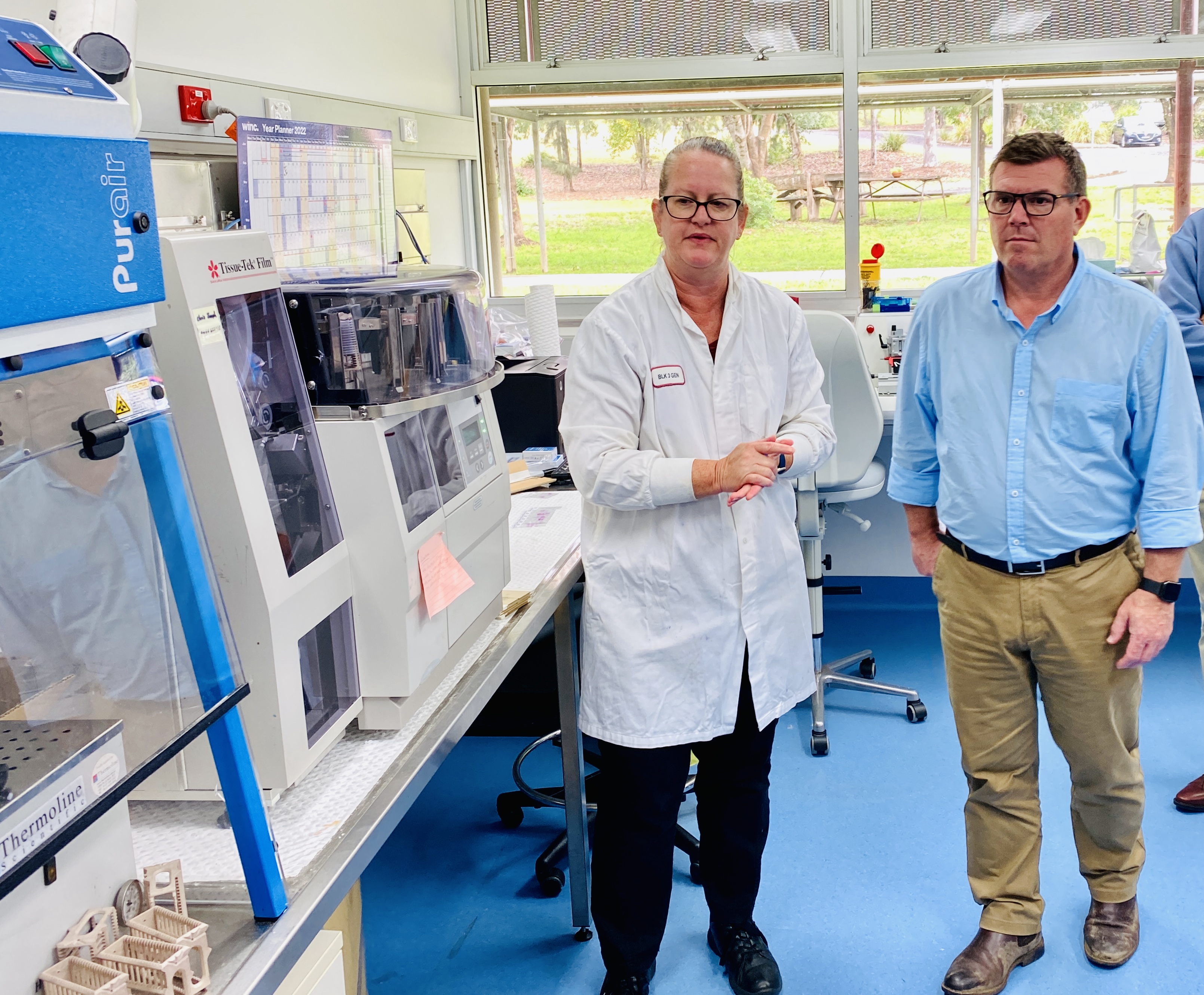BIOSECURITY AS TOP PRIORITY:
Since coming into this role in December, a focus on biosecurity has been my number one priority, and that’s why we announced a record $164 million in the 2022-23 state budget for enhanced protections.
That funding is going directly to strengthening and improving current surveillance, along with ramping up diagnostics and response techniques to bolster the prediction, detection and response management of risks in NSW.
mRNA VACCINES:
Thanks to Covid, we’ve all become aware of mRNA vaccines, and the importance they’ve played in getting us to where we are today…they will also play a role in our future biosecurity.
My vision is for NSW to be a global exporter of mRNA vaccines for livestock right across the globe…Co-designed, developed and manufactured right here in our state.
This will see the potential for NSW and the world to have another option to ‘live’ vaccines to protect our livestock industries.
The key benefit in moving away from ‘live’ vaccines, is that it will allow Australian producers to vaccinate their livestock while not losing market access.
After announcing NSW’s commitment to designing and manufacturing an mRNA vaccine for Lumpy Skin Disease, I recently confirmed our experts are also pivoting to fast track work on researching and designing mRNA vaccines for Foot and Mouth disease (which has 8 strains).
I have asked each state and the federal government for financial support to progress this as quickly as possible.
NSW, in partnership with industry, has put $5 million dollars on the table in the mRNA space, and the team is working directly with MIT in the United States and a Canadian company on development.
We have the best of the best with our world leading team at the Elizabeth Macarthur Agricultural Institute at Camden, working day and night to keep Australia’s primary industries sector safe.
The NSW government has certainly done its bit to help lead the call to action … but there are still some things we need the federal government to do.
CALLS FOR ACTION:
I am extremely pleased to see the federal government just recently agreed to install sanitising foot mats at airports – something I had been calling for along with the Deputy Premier for over a week.
Those foot mats will be located at all Australian international airports, but more importantly – at Indonesian airports including Bali, which is the main concern.
Australians love travelling to Bali and there are over 100 flights arriving per week, loaded up with return-travellers.
That number is steadily climbing to pre-covid levels.
In 2019, 1.7 million passengers came in on flights from Indonesia…That’s 4,829 people per day…201 people per hour…FMD is only one flight away from our state, or six and a half hours to be exact – that’s what keeps me up at night.
That is enough cause for all Australians to be on high alert.
These foot mats won’t be a silver bullet, but they are a great starting point of awareness for people leaving Bali to head home…as you walk over that mat, you will know you are doing it for a reason.
That needs to be followed by information on the flight, then walking over the mats at your Australian destination, and then there should be a bag inspection!
I will keep calling for the Feds to introduce mandatory bag checks for 100 percent of returning travellers from hot spots like Bali…it makes sense and I think it would be the best way to send that strong message and raise the awareness.
In the meantime: if you’re heading to Bali for a holiday – or know someone who is – please do the right thing when you return to Australia.
That means declaring where you’ve been, making sure any clothes and shoes you bring in are clean and free from soil and manure, avoiding encounters with livestock on your travels and staying away from farms or anywhere there might be livestock for seven days when you get home.
Now is not the time for complacency – one dirty pair of shoes could devastate an entire industry.
OTHER IMPORTANT BIOSECURITY DEVELOPMENTS:
On Wednesday I received unanimous support from all the Australian Agriculture Ministers for the development of industry-led mandatory sheep and goat electronic identification system.
The NSW Farmers Association is also in support of Sheep EID, voting in favour of the step at its Annual Conference.
There is a lot of work to do, and I know this has, and will continue to cause some angst, but the traceability of individual animals is something that completes the missing link for biosecurity.
My commitment is that producers and all stakeholders involved will be a part of the journey as we develop a national framework.
RISK OF FERAL PIGS TRANSMITTING FMD
Feral pigs are considered to pose a risk to the spread of FMD.
They are highly mobile and would therefore potentially facilitate spread between livestock properties.
The NSW Government is committed to feral pig management, and we have the largest feral animal aerial shooting team in Australia, in addition to our DPI and Local Land Services biosecurity staff.
An example of our on-ground experience in large feral pig control programs is the Western Riverina Pest Program, which removed 43,080 feral pigs.
The Western Riverina Pest Program demonstrates how private contractors can effectively work with government to implement control techniques, aerial shooting, baiting and trapping, in an integrated way.
That program resulted in the population density being reduced from a peak of 11.2 pigs per square kilometre in 2017 to 0.88 pigs in 2020.
Due to the large distribution of feral pigs, it is not realistic to reduce their entire population, but there are certainly more large scale eradication plans.
DETECTION OF FMD FRAGMENTS IN AUSTRALIA:
Australia remains free from Foot and Mouth Disease and African Swine Fever. This incident does not change Australia’s disease status.
I am advised that during routine surveillance and testing of meat at a market in Melbourne and a second check at Adelaide airport, some meat products tested positive for fragments of Foot and Mouth Disease and African Swine Fever.
It is not unusual to find viral fragments of African Swine Fever in meat samples. Occasionally, Foot and Mouth Disease viral fragments have also been detected.
However, there is no doubt this is a stark reminder of why no stone should be left unturned when it comes to keeping Foot and Mouth Disease out of our country.
Any breaches of Australia’s biosecurity requirements will be prosecuted to the full extent of the law.
Penalties for those who do the wrong thing include imprisonment for up to 10 years or a monetary penalty of up to $1,110,000 (or $5,550,000 for corporate entities) or both.
FINAL MESSAGE:
The detection of FMD at Bali has completely changed the dial on the awareness of how susceptible we now are in this country to a biosecurity incursion.
In NSW we will continue to lead the way … but we all need to work together – governments, industry and the community – to keep Australia FMD-free.


